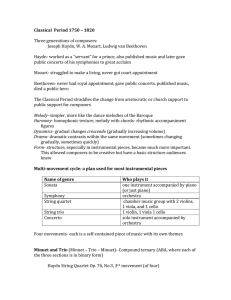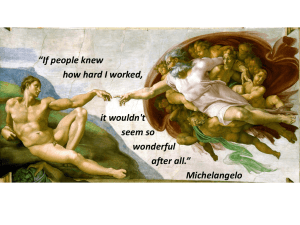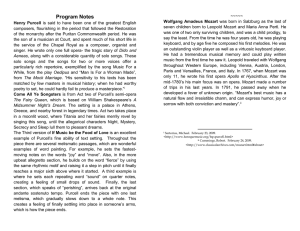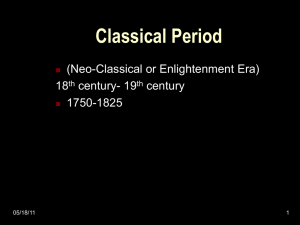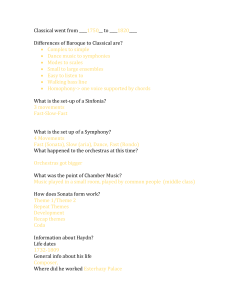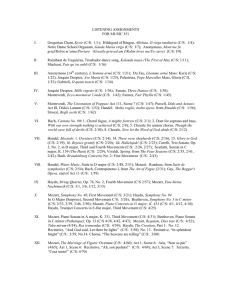program - Mostly Mozart
advertisement
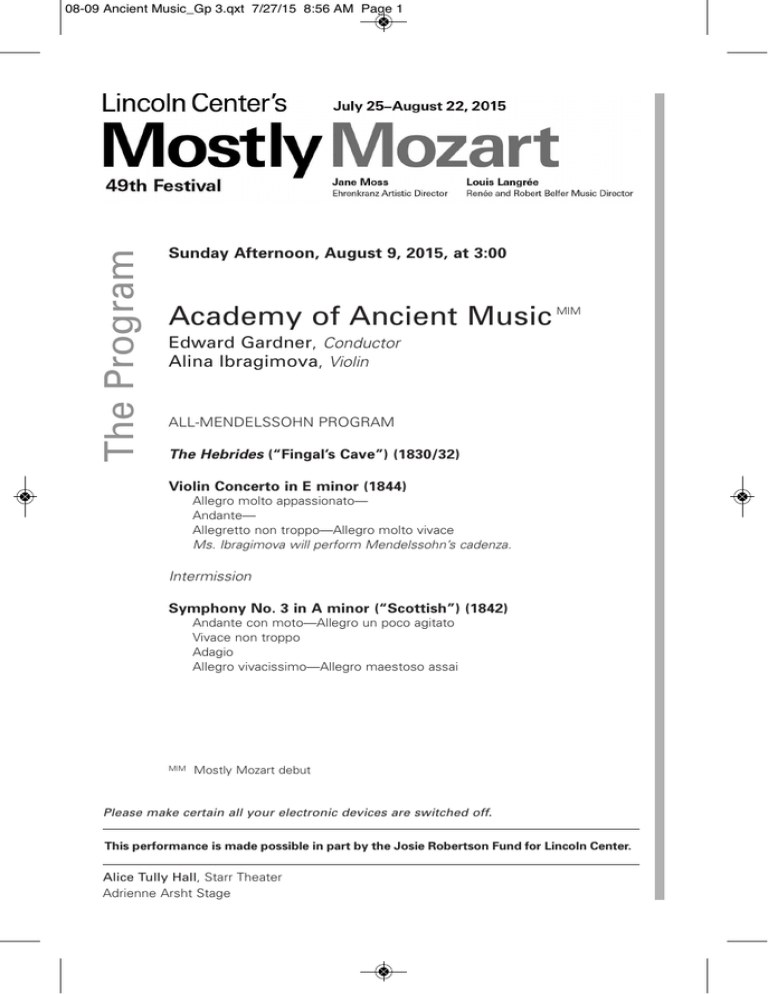
The Program 08-09 Ancient Music_Gp 3.qxt 7/27/15 8:56 AM Page 1 Sunday Afternoon, August 9, 2015, at 3:00 Academy of Ancient Music M|M Edward Gardner, Conductor Alina Ibragimova, Violin ALL-MENDELSSOHN PROGRAM The Hebrides (“Fingal’s Cave”) (1830/32) Violin Concerto in E minor (1844) Allegro molto appassionato— Andante— Allegretto non troppo—Allegro molto vivace Ms. Ibragimova will perform Mendelssohn’s cadenza. Intermission Symphony No. 3 in A minor (“Scottish”) (1842) Andante con moto—Allegro un poco agitato Vivace non troppo Adagio Allegro vivacissimo—Allegro maestoso assai M|M Mostly Mozart debut Please make certain all your electronic devices are switched off. This performance is made possible in part by the Josie Robertson Fund for Lincoln Center. Alice Tully Hall, Starr Theater Adrienne Arsht Stage 08-09 Ancient Music_Gp 3.qxt 7/27/15 8:56 AM Page 2 Mostly Mozart Festival The Mostly Mozart Festival is made possible by Sarah Billinghurst Solomon and Howard Solomon, Rita E. and Gustave M. Hauser, Chris and Bruce Crawford, The Fan Fox and Leslie R. Samuels Foundation, Inc., Charles E. Culpeper Foundation, S.H. and Helen R. Scheuer Family Foundation, and Friends of Mostly Mozart. Public support is provided by the New York State Council on the Arts. Artist Catering provided by Zabar’s and zabars.com MetLife is the National Sponsor of Lincoln Center United Airlines is a Supporter of Lincoln Center WABC-TV is a Supporter of Lincoln Center “Summer at Lincoln Center” is supported by Diet Pepsi Time Out New York is a Media Partner of Summer at Lincoln Center UPCOMING MOSTLY MOZART FESTIVAL EVENTS: Tuesday and Thursday Evenings, August 11 and 13, at 7:30 Saturday Afternoon, August 15, at 3:00 in the David H. Koch Theater Written on Skin (U.S. stage premiere) George Benjamin, Composer Martin Crimp, Text for Music Mahler Chamber Orchestra M|M Alan Gilbert, Conductor M|M Christopher Purves, The Protector M|M Barbara Hannigan, Agnès M|M Tim Mead, Angel 1/Boy M|M Victoria Simmonds, Angel 2/Marie M|M Robert Murray, Angel 3/John M|M Katie Mitchell, Director M|M Sung in English with English supertitles Presented in collaboration with the New York Philharmonic. Written on Skin is a production of the Aix-en-Provence Festival, in co-production with the Nederlandse Opera, Amsterdam, Théâtre du Capitole, Toulouse, and The Royal Opera, London. Used by arrangement with European American Music Distributors Company, U.S. and Canadian agent for Faber Music Ltd., London, publisher and copyright owner M|M Mostly Mozart debut For tickets, call (212) 721-6500 or visit MostlyMozart.org. Call the Lincoln Center Info Request Line at (212) 875-5766 to learn about program cancellations or request a Mostly Mozart brochure. Visit MostlyMozart.org for full festival listings. Join the conversation: #LCMozart We would like to remind you that the sound of coughing and rustling paper might distract the performers and your fellow audience members. In consideration of the performing artists and members of the audience, those who must leave before the end of the performance are asked to do so between pieces. The taking of photographs and the use of recording equipment are not allowed in the building. 08-09 Ancient Music_Gp 3.qxt 7/27/15 8:56 AM Page 3 Mostly Mozart Festival Welcome to Mostly Mozart I am pleased to welcome you to the 49th Mostly Mozart Festival, our annual celebration of the innovative and inspiring spirit of our namesake composer. This summer, in addition to a stellar roster of guest conductors and soloists, we are joined by composer-in-residence George Benjamin, a leading contemporary voice whose celebrated opera Written on Skin makes its U.S. stage premiere. This landmark event continues our tradition of hearing Mozart afresh in the context of the great music of our time. Under the inspired baton of Renée and Robert Belfer Music Director Louis Langrée, the Mostly Mozart Festival Orchestra delights this year with the Classical repertoire that is its specialty, in addition to Beethoven’s joyous Seventh Symphony and Haydn’s triumphant Creation. Guest appearances include maestro Cornelius Meister making his New York debut; Edward Gardner, who also leads the Academy of Ancient Music in a Mendelssohn program on period instruments; and Andrew Manze with violinist Joshua Bell in an evening of Bach, Mozart, and Schumann. Other preeminent soloists include Emanuel Ax, Matthias Goerne, and festival newcomers Sol Gabetta and Alina Ibragimova, who also perform intimate recitals in our expanded Little Night Music series. And don’t miss returning favorite Emerson String Quartet and the International Contemporary Ensemble, our artists-inresidence, as well as invigorating pre-concert recitals and lectures, a panel discussion, and a film on Haydn. With so much to choose from, we invite you to make the most of this rich and splendid festival. I look forward to seeing you often. Jane Moss Ehrenkranz Artistic Director 08-09 Ancient Music_Gp 3.qxt 7/27/15 8:56 AM Page 4 Mostly Mozart Festival I Words and Music Seaweed (Excerpts) By Henry Wadsworth Longfellow When descends on the Atlantic The gigantic Storm-wind of the equinox, Landward in his wrath he scourges The toiling surges, Laden with seaweed from the rocks: … From the tumbling surf, that buries The Orkneyan skerries, Answering the hoarse Hebrides; And from wrecks of ships, and drifting Spars, uplifting On the desolate, rainy seas; — Ever drifting, drifting, drifting On the shifting Currents of the restless main; Till in sheltered coves, and reaches Of sandy beaches, All have found repose again. So when storms of wild emotion Strike the ocean Of the poet’s soul, erelong From each cave and rocky fastness, In its vastness, Floats some fragment of a song: From the far-off isles enchanted, Heaven has planted With the golden fruit of Truth; … From the strong Will, and the Endeavor That forever Wrestle with the tides of Fate; From the wreck of Hopes far-scattered, Tempest-shattered, Floating waste and desolate; — Ever drifting, drifting, drifting On the shifting Currents of the restless heart; Till at length in books recorded, They, like hoarded Household words, no more depart. For poetry comments and suggestions, please write to programming@LincolnCenter.org. 08-09 Ancient Music_Gp 3.qxt 7/27/15 8:56 AM Page 5 Snapshot Mostly Mozart Festival By Don Anderson Mendelssohn ranks second only to Mozart among child prodigies in music. He also displayed astonishing versatility, winning international renown as composer, conductor, pianist, organist, and musical administrator. As a conductor, he selflessly championed many other composers’ music, not just such personal friends as Schumann, but masters of the past like Bach. He premiered Schubert’s Ninth Symphony in 1839, 11 years after Schubert’s death. All this activity took its toll on a never-robust artist. A series of strokes led to his death at 38. Mendelssohn’s career spanned a period of significant transition in music. The purity of expression and the widespread use of the forms established by the great figures of the Classical period— Haydn, Mozart, and the young Beethoven—were giving way to the more emotional, varied, and brightly colored Romantic style of Berlioz, Weber, Chopin, and Schumann. His particular gift was to stake out a middle ground between these two schools, combining them into a style distinctively his own. Each of the compositions on this program demonstrates his unique personality in full flower. —Copyright © 2015 by Lincoln Center for the Performing Arts, Inc. 08-09 Ancient Music_Gp 3.qxt 7/27/15 8:56 AM Page 6 Notes on the Program Mostly Mozart Festival I Notes on the Program By Don Anderson The Hebrides, Op. 26 (“Fingal’s Cave”) (1830/32) FELIX MENDELSSOHN Born February 3, 1809, in Hamburg Died November 4, 1847, in Leipzig Approximate length: 10 minutes A young, early 19th-century man of means could expect a “grand tour” of Europe as part of his education. Mendelssohn had already visited several countries when his father, a wealthy banker, sent him off on a further expedition in April 1829. He and his traveling companion, Karl Klingemann, stopped in England before heading north to Scotland. They journeyed to the Hebrides, the widely scattered group of islands located off Scotland’s northwest coast. According to Mendelssohn scholar R. Larry Todd, Mendelssohn wrote to his sister, Fanny: “In order to make you understand how extraordinarily the Hebrides affected me, the following came to my mind there.” “The following” was a draft in piano score of the opening of the Hebrides Overture, complete with orchestral cues and dynamics and in nearly final form. Reaching the island of Staffa the following day, the travelers paid a visit by rowboat to its most famous attraction. The flooded grotto known as Fingal’s Cave was named after a hero of Gaelic mythology. “A greener roar of waves surely never surged into a stranger cavern,” Klingemann wrote. “Its many pillars make it look like the inside of an immense organ, black and resonant, utterly without purpose, completely isolated.” Mendelssohn turned his impressions of the Hebrides into a concert overture. After completing a first draft in 1830, the hypercritical composer revised it several times. His changes extended to the title—for a time it bore the names Overture to the Solitary Island and The Isles of Fingal—before it reached its final form and name. Despite what might be heard as portrayals of wind, waves, and fog, The Hebrides is first and foremost an evocation of atmosphere, not a story told in music. A somber, brooding work, it erupts at times into blustery drama. In its power to evoke the majesty and mystery of the sea it served as a model for later compositions such as Wagner’s opera The Flying Dutchman and Debussy’s symphonic work La Mer. 08-09 Ancient Music_Gp 3.qxt 7/27/15 8:56 AM Page 7 Mostly Mozart Festival I Notes on the Program Violin Concerto in E minor, Op. 64 (1844) FELIX MENDELSSOHN Approximate length: 26 minutes In 1835 Mendelssohn took up the post of music director of the Gewandhaus Orchestra of Leipzig. Under his patient, exacting supervision, only a few years passed before that ensemble’s concerts came to be considered the finest given anywhere in Europe. The orchestra’s concertmaster, Mendelssohn’s old friend Ferdinand David, made important contributions to that progress. In gratitude, Mendelssohn composed this concerto for him. David performed the premiere, in Leipzig on March 13, 1845. Mendelssohn being too ill to conduct, his assistant, Niels Gade, performed the honors instead. The Violin Concerto is a beautifully polished work of art, combining sureness Did you know? of construction with passion, warmth, and playfulness. Mendelssohn directed In 1842 Mendelssohn entertained that the three movements be played Queen Victoria and Prince Albert without any breaks between them, a during a visit to Buckingham typical Romantic practice designed to Palace. He played his own piano increase the music’s cohesiveness and pieces and accompanied the sense of momentum. The majority of monarchs as they sang his songs. the concerto’s dramatic content unfolds during the urgent first movement. The second movement is an interlude of gentle melodic beauty. A brief bridge passage then ushers in the impish finale. Its solo fireworks are backed by a Mendelssohn trademark: a gossamer-light style of orchestration. Symphony No. 3 in A minor, Op. 56 (“Scottish”) (1842) FELIX MENDELSSOHN Approximate length: 40 minutes During the same tour of Scotland that sparked Mendelssohn to compose The Hebrides, further inspiration sprang from a visit to the ruined chapel of Holyrood Palace near Edinburgh. “This evening in the deep twilight,” he wrote home on July 30, 1829, “we went to the palace where Queen Mary lived and loved; there is a small room with a winding staircase leading up to it...The adjacent chapel has lost its roof; grass and ivy grow thickly within; and on the broken altar Mary was crowned Queen of Scotland. Everything there is in ruins and ramshackle, open to the blue sky. I think I have today found the opening of my Scottish Symphony.” 08-09 Ancient Music_Gp 3.qxt 7/27/15 8:56 AM Page 8 Mostly Mozart Festival I Notes on the Program The tour continued to Italy in May 1830. Mendelssohn kept working on the symphony, but gradually the sunny Mediterranean climate dissipated the call of his Celtic muse. He did not complete the piece for another 12 years, a period during which he composed the “Italian” Symphony (known as No. 4), in full. He conducted the premiere of the “Scottish” himself, in Leipzig on March 3, 1842. He dedicated it to one of his staunchest admirers, Queen Victoria of England. Although it was the last to be completed of the five symphonies he composed as an adult, it was the third to be published. This is how it acquired the misleading designation of “Symphony No. 3.” Mirroring the structure of the Violin Concerto, Mendelssohn instructed that the four movements be performed as a continuous whole. It opens with a quiet, plaintive, darkly colored introduction based upon the “Holyrood Palace” theme. This leads to a highly active and dramatic first movement proper. Mendelssohn offered only token relaxation through a sad, sighing second theme. The second movement is a jaunty, featherweight scherzo in which the influence of Scottish folk music is felt strongly. The third movement is a slow, almost mournful procession that grows increasingly forceful. The warlike finale is highly rhythmic, with materials passed about rapidly between the sections of the orchestra. As in the first movement, the tumult dies down to a whisper. This time the music rises up in glory through a majestic, hymn-like transformation of the “Holyrood Palace” theme. It spreads rapidly throughout the orchestra, setting upon the symphony an uplifting seal of triumph. Don Anderson is an internationally recognized advocate of classical music. He has more than 35 years’ professional experience in celebrating it through print, radio, and teaching. —Copyright © 2015 by Lincoln Center for the Performing Arts, Inc. 08-09 Ancient Music_Gp 3.qxt 7/27/15 8:56 AM Page 9 BENJAMIN EALOVEGA Meet the Artists Mostly Mozart Festival I Meet the Artists Edward Gardner Considered one of the most talented conductors of his generation, Edward Gardner served as music director of Glyndebourne on Tour from 2004 to 2007 before taking up his position as music director of English National Opera in 2007. He has since presented many successful productions for ENO, as well as for the Metropolitan Opera, Teatro alla Scala, and the Paris National Opera. In October 2015 Mr. Gardner will take up his new appointment as chief conductor of the Bergen Philharmonic Orchestra and will lead their 250th anniversary gala concert. He became their principal guest conductor in August 2013. Mr. Gardner has also been principal guest conductor of the City of Birmingham Symphony Orchestra since 2011. He has enjoyed a flourishing relationship with the BBC Symphony Orchestra since 2005, and in 2011 he conducted them at the last night of the Proms. Mr. Gardner works with some of the world’s major orchestras, including the Boston, Toronto, Montreal, Danish National, and Swedish Radio symphony orchestras; Netherlands Radio and Czech Philharmonic Orchestras; Royal Concertgebouw Orchestra; Deutsches Symphonie-Orchester Berlin; Gewandhaus Orchestra of Leipzig; Rotterdam Philharmonic; Orchestre Philharmonique de Radio France; and the National Academy of St. Cecilia Orchestra. As an exclusive recording artist for Chandos Records, Mr. Gardner has recently released acclaimed discs of Walton, Mendelssohn, Lutosławski, Britten, and Berio with the City of Birmingham Symphony Orchestra, BBC Symphony Orchestra, and Bergen Philharmonic Orchestra, as well as other releases with the Gothenburg Symphony Orchestra, the Academy of St. Martin in the Fields, and English National Opera Orchestra. Mr. Gardner’s awards include the Royal Philharmonic Society Conductor Award in 2007 and the Laurence Olivier Award for Outstanding 08-09 Ancient Music_Gp 3.qxt 7/27/15 8:56 AM Page 10 Mostly Mozart Festival I Meet the Artists Achievement in Opera in 2009. In 2012 he was awarded an OBE for his services to music in the Queen’s Birthday Honors. EVA VERMANDEL Alina Ibragimova Performing music from Baroque classics to new commissions on both period and modern instruments, Alina Ibragimova has appeared with orchestras and in recital around the globe. In the 2015–16 season she will appear with Apollo’s Fire for concerts in Cleveland and at the BBC Proms, where she is one of this year’s featured artists. She will also join the Bergen Philharmonic Orchestra and Andrew Litton for Mendelssohn’s Violin Concerto in E minor, and return to North America for debuts with the Boston, Montreal, and Madison symphony orchestras. Ms. Ibragimova will also give solo recitals for Club Musical de Québec and the new Faena Arts Center in Miami Beach. During the 2014–15 season Ms. Ibragimova appeared with the Philadelphia and Cleveland Orchestras, as well as with the North Carolina Symphony. She also performed solo Bach recitals at the Park Avenue Amory and the Phillips Collection in Washington, D.C. Highlights among recent and upcoming plans include return engagements with the London Symphony Orchestra, Bergen Philharmonic Orchestra, and Royal Liverpool Philharmonic, as well as debuts with the Hungarian National Philharmonic Orchestra, Bamberger Symphoniker, and Scottish Chamber Orchestra. Born in Russia in 1985, Ms. Ibragimova studied at the Moscow Gnesin School before moving with her family in 1995 to the UK, where she studied at the Yehudi Menuhin School and Royal College of Music. She records for Hyperion Records and performs on a c.1775 Anselmo Bellosio violin kindly provided by Georg von Opel. Academy of Ancient Music For more than 40 years the Academy of Ancient Music (AAM) has enriched the lives of thousands the world over with historically informed performances of Baroque and Classical music. Founded in 1973 by Christopher Hogwood— and under the current direction of Richard Egarr, a leading light in the next generation of early music exponents—the orchestra enjoys a global reputation for 08-09 Ancient Music_Gp 3.qxt 7/27/15 8:56 AM Page 11 Mostly Mozart Festival I Meet the Artists combining scholarship with superb musicianship to create performances acclaimed for their vitality and immediacy. Originally established as a recording orchestra, the AAM has recorded more than 300 CDs, garnering countless accolades including Brit, Gramophone, Edison, and MIDEM awards. On its own in-house label, AAM Records, the orchestra has released four critically acclaimed studio recordings, most recently the original 1727 version of Bach’s St. Matthew Passion. In 2010 the AAM launched its AAMplify education program. Partnerships in Cambridge, London, and Manchester, UK, now reach hundreds of children and young people each year through innovative workshops, master classes, and projects. The AAM’s 2015–16 season will see the conclusion of a three-year cycle of Monteverdi’s operas in partnership with the Barbican Centre; a principal-player focus highlighting the orchestra’s core musicians; and exciting collaborations with Ian Bostridge, Bernard Labadie, Lucy Crowe, and Reinhard Goebel. International touring will see the orchestra perform in Asia, the U.S., and Europe, and plans for AAM Records include a series of recordings of the music of Venetian composer Dario Castello. The AAM is Associate Ensemble at London’s Barbican Centre and Orchestrain-Residence at the University of Cambridge. Mostly Mozart Festival Lincoln Center’s Mostly Mozart Festival—America’s first indoor summer music festival—was launched as an experiment in 1966. Called Midsummer Serenades: A Mozart Festival, its first two seasons were devoted exclusively to the music of Mozart. Now a New York institution, Mostly Mozart continues to broaden its focus to include works by Mozart’s predecessors, contemporaries, and related successors. In addition to concerts by the Mostly Mozart Festival Orchestra, Mostly Mozart now includes concerts by the world’s outstanding period-instrument ensembles, chamber orchestras and ensembles, and acclaimed soloists, as well as opera productions, dance, film, late-night performances, and visual art installations. Contemporary music has become an essential part of the festival, embodied in annual artists-in-residence, including Osvaldo Golijov, John Adams, Kaija Saariaho, Pierre-Laurent Aimard, and the International Contemporary Ensemble. Among the many artists and ensembles who have had long associations with the festival are Joshua Bell, Christian Tetzlaff, Itzhak Perlman, Emanuel Ax, Garrick Ohlsson, Stephen Hough, Osmo Vänskä, the Emerson String Quartet, Freiburg Baroque Orchestra, Orchestra of the Age of Enlightenment, and the Mark Morris Dance Group. 08-09 Ancient Music_Gp 3.qxt 7/27/15 8:56 AM Page 12 Mostly Mozart Festival Lincoln Center for the Performing Arts, Inc. Lincoln Center for the Performing Arts (LCPA) serves three primary roles: presenter of artistic programming, national leader in arts and education and community relations, and manager of the Lincoln Center campus. A presenter of more than 3,000 free and ticketed events, performances, tours, and educational activities annually, LCPA offers 15 programs, series, and festivals, including American Songbook, Great Performers, Lincoln Center Festival, Lincoln Center Out of Doors, Midsummer Night Swing, the Mostly Mozart Festival, and the White Light Festival, as well as the Emmy Award–winning Live From Lincoln Center, which airs nationally on PBS. As manager of the Lincoln Center campus, LCPA provides support and services for the Lincoln Center complex and the 11 resident organizations. In addition, LCPA led a $1.2 billion campus renovation, completed in October 2012. Lincoln Center Programming Department Jane Moss, Ehrenkranz Artistic Director Hanako Yamaguchi, Director, Music Programming Jon Nakagawa, Director, Contemporary Programming Jill Sternheimer, Acting Director, Public Programming Lisa Takemoto, Production Manager Charles Cermele, Producer, Contemporary Programming Kate Monaghan, Associate Director, Programming Claudia Norman, Producer, Public Programming Mauricio Lomelin, Producer, Contemporary Programming Julia Lin, Associate Producer Nicole Cotton, Production Coordinator Regina Grande, Assistant to the Artistic Director Luna Shyr, Programming Publications Editor Claire Raphaelson, House Seat Coordinator Stepan Atamian, Theatrical Productions Intern; Annie Guo, Production Intern; Grace Hertz, House Program Intern Program Annotators: Don Anderson, Peter A. Hoyt, Kathryn L. Libin, Paul Schiavo, David Wright 08-09 Ancient Music_Gp 3.qxt 7/27/15 8:56 AM Page 13 PATRICK HARRISON Mostly Mozart Festival I Meet the Artists Academy of Ancient Music Violin I Pavlo Beznosiuk Iwona Muszynska Sijie Chen Stephen Pedder Persephone Gibbs Kinga Ujszászi Simon Kodurand Pierre Joubert Violin II Rebecca Livermore William Thorp Liz MacCarthy Joanna Lawrence Marianna Szücs Fiona Duncan Naomi Burrell Alice Earll Viola Jane Rogers Ricardo Cuende Isuskiza Clare Barwick Emma Alter Heather Birt Jordan Bowron Cello Joseph Crouch Imogen Seth-Smith Cassandra Luckhardt Jonathan Rees Bass Judith Evans Dawn Baker Kate Aldridge Flute Rachel Brown Guy Williams Oboe Leo Duarte Mark Radcliffe Clarinet Katherine Spencer Margaret Archibald Bassoon Jane Gower Sally Jackson Horn Gavin Edwards David Bentley Nick Benz Clare Penkey Brendan Thomas Trumpet Simon Munday Matthew Wells Timpani Benedict Hoffnung 08-09 Ancient Music_Gp 3.qxt 7/27/15 8:56 AM Page 14 Mostly Mozart Festival Lectures, Discussions, and Pre-concert Recitals All events are FREE to ticketholders of the accompanying performance. Friday and Saturday Evenings, July 31 and August 1, at 6:30 Orion Weiss, piano Brahms: Klavierstücke, Op. 118 Avery Fisher Hall Tuesday and Thursday Evenings, August 11 and 13 Written on Skin post-performance artist discussions David H. Koch Theater Monday Evening, August 3, at 6:30 Emerson String Quartet Haydn: Quartet in G major, Op. 76, No. 1 Alice Tully Hall Friday and Saturday Evenings, August 14–15, at 6:30 Jon Manasse, clarinet, Ilya Finkelshteyn, cello, and Jon Nakamatsu, piano Brahms: Clarinet Trio Avery Fisher Hall Tuesday Evening, August 4, at 6:30 Anderson & Roe Piano Duo Ligeti/Anderson & Roe: Hungarian Rock Brahms: Haydn Variations Avery Fisher Hall Wednesday Evening, August 5, at 6:30 Anderson & Roe Piano Duo Brahms: Haydn Variations Anderson & Roe, after Mozart: Ragtime alla turca Avery Fisher Hall Friday and Saturday Evenings, August 7–8, at 6:30 Calidore String Quartet Haydn: Quartet in C major (“The Bird”) Avery Fisher Hall Tuesday and Wednesday Evenings, August 11–12, at 6:30 Charlie Albright, piano Beethoven: “Moonlight” Sonata Chopin: Four Etudes, Op. 25 Avery Fisher Hall Saturday Afternoon, August 15, from 4:00 to 5:30 Panel Discussion: Listening to Mozart Bruce Alan Brown, moderator Presented in association with the Mozart Society of America Stanley H. Kaplan Penthouse Seating available on a first-come, first-served basis. Tuesday and Wednesday Evenings, August 18–19, at 6:30 Tyler Duncan, baritone, and Erika Switzer, piano Schumann: Liederkreis, Op. 24 Avery Fisher Hall Friday Evening, August 21, from 6:15 to 7:00 Pre-concert lecture on Haydn’s Creation by Elaine Sisman Stanley H. Kaplan Penthouse ALICE TULLY HALL, AVERY FISHER HALL Broadway at 65th Street DAVID H. KOCH THEATER Columbus Avenue at 63th Street DAVID RUBENSTEIN ATRIUM Broadway between 62nd and 63rd Streets STANLEY H. KAPLAN PENTHOUSE 165 West 65th Street, 10th Floor 08-09 Ancient Music_Gp 3.qxt 7/27/15 8:56 AM Page 15 Mostly Mozart Festival Wolfgang Amadeus Mozart Chronology 1756 January 27: Joannes Chrysostomus Wolfgangus Theophilus Mozart born in Salzburg, Austria, the youngest child of Johann Georg Leopold Mozart and his wife, Anna Maria. 1761 First composition, Andante in C major for keyboard; first known public appearance at Salzburg University in a music theater piece. 1762 Leopold Mozart journeys to Munich and Vienna with Wolfgang and his older sister, Nannerl, to exploit their prodigious talents on the harpsichord. 1764 Meets J.C. Bach, youngest son of J.S. Bach. Mozart writes his first symphony. 1767 Performance of Apollo et Hyacinthus, Mozart’s first theatrical work, in Salzburg. Travels to Vienna. Wolfgang and Nannerl fall ill with smallpox. 1769 Return to Salzburg. Mozart named honorary Konzertmeister of the Hofkapelle in Salzburg. 1772 Premiere of opera seria Lucio Silla on December 26 in Milan; completion of motet Exsultate, jubilate a few weeks later. 1778 Arrival in Paris after a lengthy journey through Augsburg and Mannheim, where he meets soprano Aloysia Weber. Performance of the “Paris” Symphony. Illness and death of Mozart’s mother. Aloysia rejects Mozart’s marriage proposal. 1779 Composition of “Coronation” Mass in C major. 1781 First major adult opera commission results in Idomeneo, premiered in Munich. Travels to Vienna, where he is discharged from the service of the archbishop of Salzburg. 1782 Composition and premiere of the opera Die Entführung aus dem Serail in Vienna. Marriage to Constanze Weber, sister of Aloysia. 1783 First child born in June and dies in August. Premiere of unfinished Mass in C minor, K.427. 1784 Mozart accepted into the Freemason lodge Zur Wohlthätigkeit. Six piano concertos written in Vienna. Frequent public and private concerts in Vienna show him at the peak of his fortunes. Birth of second child, Karl Thomas, who survives. Probable first meeting with Haydn; the beginning of a devoted friendship between the two masters. 1785 Cycle of six string quartets, which Mozart dedicates to Haydn, is published by Artaria. Composes Piano Concerto No. 20 in D minor and No. 21 in C major. 1786 Premiere of Le nozze di Figaro in Vienna’s Burgtheater is successful despite the opera’s potential to be politically and socially inflammatory. Writes Symphony in D major (“Prague”) and Piano Concerto No. 25 in C major. Mozart’s third child is born in October and dies in November. 1787 Mozart directs a performance of Figaro in Prague to great success. Performance of “Prague” Symphony and premiere of Don Giovanni in Prague also meet with positive reception. Leopold Mozart, age 68, dies in Salzburg. Returns to Vienna in November and birth of fourth child, Theresia, in December. The 16-year-old Beethoven briefly visits Vienna and most likely meets Mozart. 1788 Viennese premiere of Don Giovanni meets with moderate success. Death of Theresia. Last three symphonies written: No. 39 in E-flat major, No. 40 in G minor, and No. 41 in C major (“Jupiter”). 1789 Financial instability. Starts work on Così fan tutte. Mozart’s fifth child, Anna Maria, dies one hour after birth. Mozart conducts his reorchestration of Handel’s Messiah. 1790 Premiere of Così fan tutte in Vienna. Musical productivity hindered by ongoing financial stress. Before leaving for London, Haydn dines with Mozart for the last time. 1791 Mozart completes his 27th and last piano concerto. Interruption of work on Die Zauberflöte to write the commissioned work La clemenza di Tito, celebrating the coronation of Leopold II as king of Bohemia. Birth of sixth child, Franz Xaver, who survives. Premiere of Die Zauberflöte in Vienna with Mozart conducting from the keyboard. Clarinet Concerto written for Anton Stadler. Receives commission for a requiem mass and begins work on the Requiem, K.626, but falls ill in November. Mozart dies in Vienna on December 5 and is buried quietly and unceremoniously in a mass grave. 08-09 Ancient Music_Gp 3.qxt 7/27/15 8:56 AM Page 16 Accessibility at Lincoln Center R eflecting a quote by Lincoln Center’s first president John D. Rockefeller III that “the arts are not for the privileged few, but for the many,” Lincoln Center has had as a central mission from its start making the arts available to the widest possible audiences. In 1985, that led to the establishment of the Department of Programs and Services for People with Disabilities to ensure full participation in the thousands of events presented annually across the Lincoln Center campus. It was the first such program at any major performing arts center in the U.S. and has longserved as a model for other arts institutions around the country. Celebrating its 30th anniversary with a new name, Accessibility at Lincoln Center, the program continues to provide exceptional guest care to all visitors, as well as training in accessibility to colleagues at Lincoln Center’s resident organizations, including the Film Society of Lincoln Center, the New York Philharmonic, and Jazz at Lincoln Center. Accessibility oversees the production of large-print and Braille programs for hundreds of performances taking place each year at various Lincoln Center venues. Another major component of Accessibility is its longstanding “Passport to the Arts.” The program annually distributes to children with disabilities thousands of free tickets to a variety of Lincoln Center performances, including New York City Ballet and the New York Philharmonic—a welcoming introduction to the arts. A parent who participated in a recent “Passport” event commented “It allowed my family and I to enjoy and learn along with everyone else. The accessibility… made it easier for our family to “relax” and truly enjoy the experience.” Accessibility is expanding the ways it serves adults with disabilities. It introduced and oversees American Sign Languageled official tours of Lincoln Center, and offers live audio description for select Lincoln Center Festival performances. Accessibility looks forward to growing its inclusive programs in the years to come. To learn more about Accessibility at Lincoln Center, please contact access@lincolncenter.org or call 212.875.5375.
